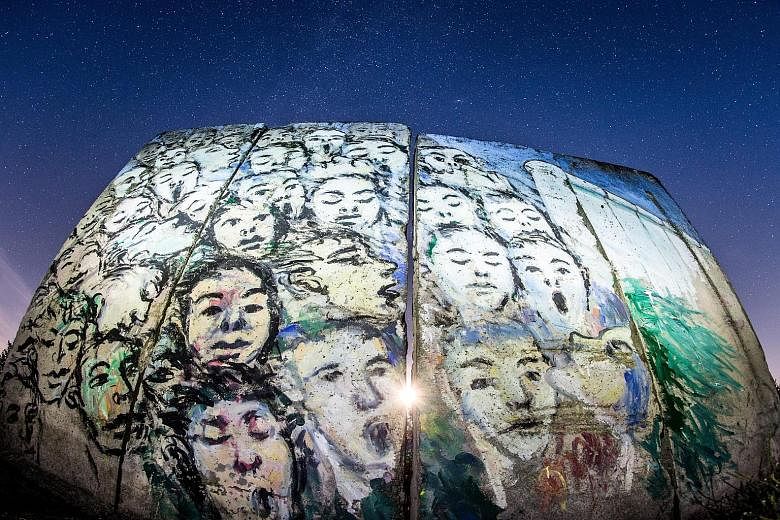BERLIN • Germany yesterday celebrated 25 years since its joyful reunification, with its leaders urging the nation to muster the same strength and solidarity to face a record refugee influx.
The silver anniversary of the day communist East Germany and the capitalist West reunited as one country comes with Europe's top economy standing at a crossroads.
Chancellor Angela Merkel and President Joachim Gauck, both of whom grew up under communism, attended ceremonies in the business capital Frankfurt with the resonant slogan "Overcoming Borders".
In the keynote speech, Mr Gauck focused on the refugee crisis and called on Germans to recapture the same can-do spirit that gripped the country in the heady months between the fall of the Berlin Wall and the remarriage of east and west.
"Today we celebrate the courage and self-confidence of that time. Let us use this memory as a bridge," said Mr Gauck, who was a dissident pastor in East Germany.
"In 1990, too, there was the legitimate question: 'Are we up to this challenge?' Then, too, there was no example from history to follow. And nevertheless, millions of people took on the national task of unification and made Germany into a country that was more than the sum of its parts."
Dr Merkel, who will mark 10 years in power next month, is grappling with the arrival this year of up to one million people fleeing war and hardship.
Buoyed by a robust economy and job market, voters have largely backed her policy of extending help. Volunteers have greeted hundreds of thousands with open arms and mountains of donated essentials in moving scenes that Dr Merkel has said made her "proud of this country".
However, as the numbers have grown, Dr Merkel's popularity has slipped as she comes under fire from critics at home and abroad for her willing acceptance of the burden on Europe.
Dr Merkel said yesterday the migrant crisis represented an epochal test for the European Union.
"Twenty-five years on, we are facing great challenges with the issue of refugees," she told reporters in Frankfurt. "Now, too, we Germans will not be able to solve the problem on our own but only with Europe, with a fair division of the burden, and with the rest of the world."
On Oct 3, 1990, just under a year after the Berlin Wall was pulled down in a bloodless revolution, the reunification treaty bringing the two halves of the country together came into effect amid jubilant scenes. Ever since, this date has been a public holiday to mark Germany's national day.
Yet divisions persist.
Sixty-six per cent of Germans say reunification was the right decision. But 71 per cent of westerners and 83 per cent of easterners argue that "major differences" endure between the two halves, opinion research firm YouGov said.
AGENCE FRANCE-PRESSE

